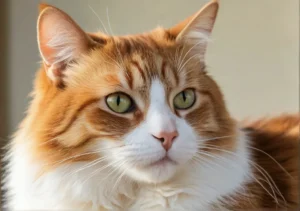Have you ever wondered why your feline friend becomes so chatty once the sun goes down? Let’s unravel the mystery behind why cats are so vocal at night.
Cats communicate through various vocalizations, especially during nighttime hours. Let’s explore the reasons behind this behavior and how you can better understand your nocturnal companion.
1. The Evolution of Nighttime Vocalizations
Cats are known for their nocturnal nature, which can be traced back to their wild ancestors. In the wild, cats were efficient hunters who relied on stealth and cunning to catch their prey, especially at night when their prey was most active. To communicate with other cats and coordinate their hunting efforts, vocalizations became crucial.
Through evolution, cats have retained this instinct to be vocal at night, even though domestic cats no longer need to hunt for food. This behavior is deeply ingrained in their DNA, making them more vocal during the nighttime hours compared to the day. So, if your cat seems to have a lot to say in the middle of the night, remember that it’s just their ancestral instincts at play.
2. Seeking Attention and Affection
Cats are known for being independent creatures, but they also crave attention and affection from their human companions. Meowing is one way they communicate their needs, whether it’s asking for food, wanting to play, or seeking some cuddles.
When your cat meows at night, they might be trying to get your attention for various reasons. It could be that they’re feeling lonely, hungry, or simply want some companionship. By responding to their vocalizations with love and care, you can strengthen the bond between you and your feline companion.
Tip : If your cat’s nighttime vocalizations are becoming excessive, make sure to rule out any medical issues with a visit to the vet. Sometimes, excessive meowing can be a sign of pain or discomfort that needs to be addressed promptly.
Territorial Behavior
Cats are so vocal at night because they use vocalizations to mark their territory and warn off potential threats or intruders. Your furry feline friend is essentially telling other cats, “This is my turf, stay away!” The darkness of night often amplifies these territorial instincts, as cats feel the need to protect their space when visibility is low. So, if you hear your cat meowing loudly in the wee hours, it’s likely just trying to assert its dominance and keep unwanted visitors at bay.
The Impact of Environmental Stimuli
The nighttime hours can trigger increased vocalizations in cats due to various environmental stimuli. Factors such as sudden noises, changes in routine, or even lights shining through the window can disrupt your cat’s sense of calm. Cats are creatures of habit, so any disruption to their nighttime routine can lead to more vocal behavior as they try to communicate their discomfort or disorientation. If your cat is howling at night, take a look around and see if there’s anything in its environment that could be causing this behavior.
- Physical discomfort: Make sure your cat has a comfortable sleeping spot away from distractions.
- Playtime before bed: Engage your cat in interactive play sessions before bedtime to tire it out.
- Consistent routine: Stick to a regular feeding and play schedule to minimize disruptions.
- Provide hiding spots: Cats feel secure in cozy hiding spots, especially at night.
- Visit the vet: If excessive vocalization persists, consult your vet to rule out any underlying health issues.
By addressing these environmental triggers and providing a comforting space for your cat, you can help minimize nighttime vocalizations and ensure both you and your feline friend get a good night’s sleep.
5. Health and Medical Concerns
Excessive vocalizations at night by your feline friend could be a red flag for underlying health issues. Cats are notorious for hiding signs of sickness, so paying attention to changes in behavior is crucial. If your cat suddenly becomes more vocal at night, it may be experiencing pain or discomfort. Common health issues that can cause nighttime vocalizations include: 1. Urinary tract infections: Cats with UTIs may cry out due to pain while urinating. 2. Hyperthyroidism: This condition can cause restlessness and excessive vocalizations. 3. Dental problems: Toothaches or gum issues can lead to increased meowing. 4. Arthritis: Older cats may vocalize more at night due to joint pain.
If you notice these vocalizations persisting, it’s essential to consult a veterinarian. They can perform a thorough examination to diagnose any health concerns and provide appropriate treatment. Remember, your cat’s vocalizations might be its way of communicating distress, so prompt attention is key to keeping your furry companion healthy and happy.
6. Training and Behavioral Modifications
Managing or reducing nighttime vocalizations in your cat involves positive reinforcement and behavioral modification techniques. Understanding the root cause of the behavior is essential to effectively address it. Here are some tips to help curb excessive meowing at night: – Establish a routine: Cats thrive on consistency, so create a predictable nighttime routine to help reduce anxiety. – Interactive playtime: Engage your cat in play sessions before bedtime to tire them out and encourage a more restful sleep. – Comfort items: Provide cozy sleeping spots and comforting toys to help your cat feel secure at night. – Avoid reinforcing the behavior: Refrain from giving attention or treats when your cat meows at night to prevent reinforcement of the behavior. – Consult a behaviorist: If the vocalizations persist, seek guidance from a professional behaviorist to develop a tailored plan.
By implementing these strategies and being patient with your furry friend, you can work towards a quieter night for both you and your cat. Remember, consistency and positive reinforcement are key to modifying your cat’s behavior effectively.
Creating a Comfortable Sleep Environment
Is your cat meowing up a storm at night? They might be trying to tell you they’re not getting a good night’s sleep! Just like us, cats need a cozy and safe sleeping space to rest peacefully. Make sure your feline friend has a comfortable bed in a quiet corner of the house where they can relax undisturbed. Provide soft blankets or cushions for extra comfort, and consider using a pheromone diffuser to promote a sense of security. By creating an inviting sleep environment, you can help reduce your cat’s nighttime vocalizations and ensure they get the rest they need.
Nighttime Enrichment Activities
If your cat is keeping you up with their meowing at night, they may be feeling bored or restless. To curb excessive vocalizations, try engaging your cat in nighttime enrichment activities that stimulate their senses and provide mental engagement. Set up interactive toys that encourage play and hunting behaviors, such as puzzle feeders or laser pointers. Consider introducing a new scratching post or climbing tree to keep your cat active and entertained during the night. By providing these enriching activities, you can help satisfy your cat’s natural instincts and decrease their need to vocalize.
Additional Insight: When it comes to nighttime enrichment activities, try incorporating calming scents into your cat’s environment. Consider using lavender or chamomile diffusers to create a soothing atmosphere that promotes relaxation and reduces stress for your feline companion. These calming scents can help create a peaceful nighttime environment, leading to less disruptive vocalizations from your cat.
Alex, a passionate animal lover, has experience in training and understanding animal behavior. As a proud pet parent to two dogs and three cats, he founded AnimalReport.net to share insights from animal experts and expand his knowledge of the animal kingdom.




